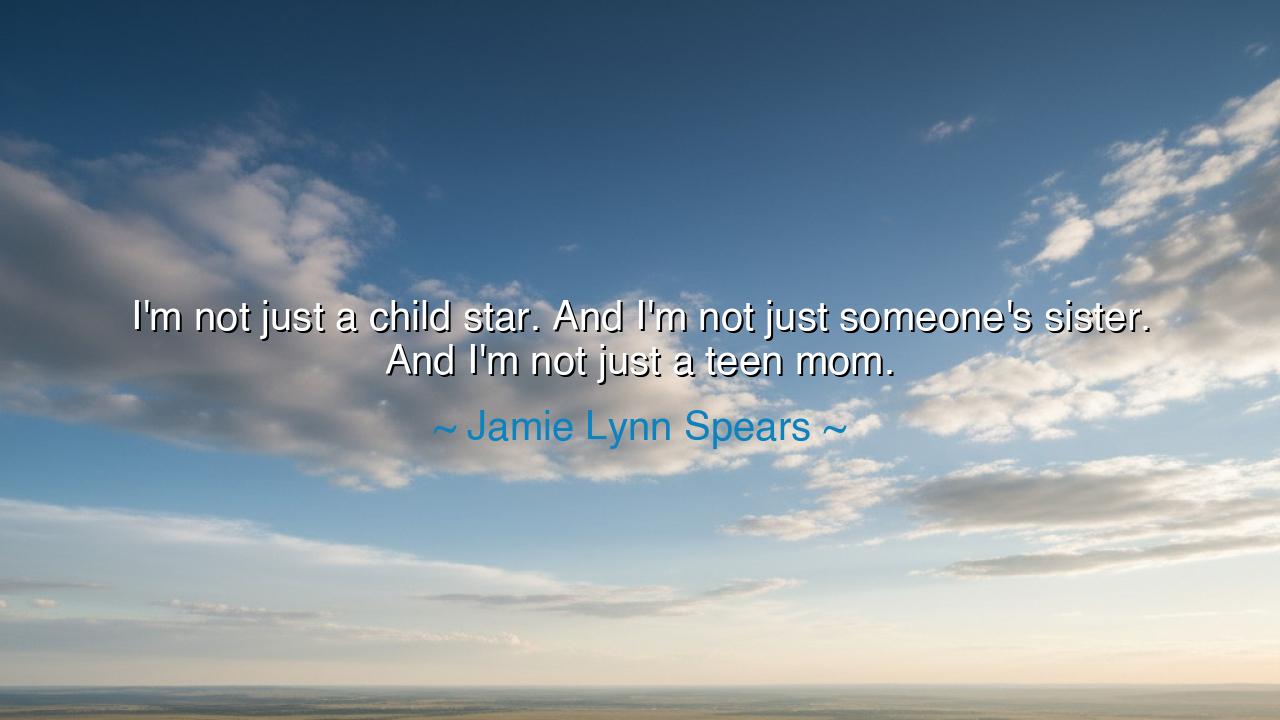
I'm not just a child star. And I'm not just someone's sister.
I'm not just a child star. And I'm not just someone's sister. And I'm not just a teen mom.






Hear the voice of Jamie Lynn Spears, who spoke with defiance and dignity: “I’m not just a child star. And I’m not just someone’s sister. And I’m not just a teen mom.” These words rise not merely as self-defense, but as a declaration of identity, forged against the weight of labels. For the world is quick to name, to confine, to reduce a soul into fragments. Yet Spears reminds us that a human being is never a single story, never a single mistake, never a single role—they are a whole tapestry, woven of many threads.
To be called a child star is both a crown and a chain. The crown shines with early success, recognition, and promise, yet the chain binds one to the past, as though youth’s fame must forever define adulthood’s life. Spears rejects this. She will not allow her beginnings in entertainment to dictate her entire worth. To be someone’s sister, too—particularly the sister of Britney Spears, a name that towered like a colossus over pop culture—is to live in a shadow not of your making. Again, Spears asserts her independence: she is not merely an extension of another’s fame.
And to be a teen mom—a label so often used with judgment, pity, or scorn—is perhaps the heaviest of all. Society wields it as a weapon, seeking to confine the young mother to a narrative of failure. Yet Spears’ words strike this chain apart. Yes, she bore that identity, but she is not consumed by it. Her life, her journey, her humanity cannot be reduced to those two words. In this, she speaks not only for herself, but for all who have been reduced by labels, who long to be seen as whole.
History echoes with others who faced the burden of labels. Consider Joan of Arc, dismissed by her enemies as a “peasant girl” and “heretic.” They believed those words could contain her. Yet her courage, her vision, and her fire transcended every insult. Or think of Abraham Lincoln, once called nothing more than a “backwoods lawyer,” who rose to lead a fractured nation. The world names and diminishes—but greatness is found in those who refuse to be diminished. Spears’ statement lives in that tradition: a rejection of the world’s narrow vision.
There is also profound wisdom in the repetition of her phrase: “I’m not just…” This rhythm is the language of liberation. Each “not just” is a blow against the prison of others’ expectations. Each “not just” is a reminder that our stories are too vast for easy categorization. In her words we hear a cry that belongs to all humanity: Do not define me by a single chapter when I am an entire book.
The lesson here is both personal and universal. To those who struggle under labels—whether of failure, of family, of circumstance—know this: you are not defined solely by what the world names you. You are not just a role, a mistake, a relationship, or a moment in time. You are more. Your life is made of choices yet to be lived, of strengths yet to be revealed. And the act of declaring this truth aloud, as Spears has done, is itself an act of courage.
So let these words guide you: when others try to confine you, speak back, “I am not just what you say.” Live in a way that proves the fullness of your being. Seek growth beyond labels, embrace the wholeness of your identity, and extend this vision to others—never reducing them to fragments. For the world may try to write your story with a single word, but only you can write the book entire. And in that truth lies your freedom.






AAdministratorAdministrator
Welcome, honored guests. Please leave a comment, we will respond soon